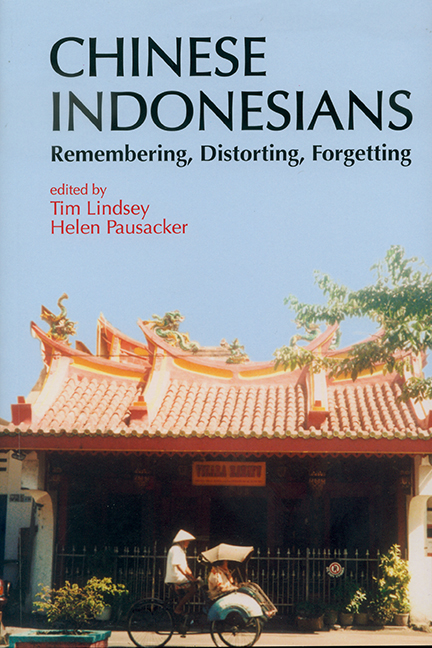Book contents
- Frontmatter
- Contents
- Preface
- A Brief Biography
- Contributors
- Glossary
- Introduction: Researching the Margins
- Bibliography of Charles Coppel's Work
- 1 Anti-Chinese Violence and Transitions in Indonesia: June 1998–October 1999
- 2 Reconstituting the Ethnic Chinese in Post-Soeharto Indonesia: Law, Racial Discrimination, and Reform
- 3 Buddhism and Confucianism in Contemporary Indonesia: Recent Developments
- 4 Portrait of the Chinese in Post-Soeharto Indonesia
- 5 The Makam Juang Mandor Monument: Remembering and Distorting the History of the Chinese of West Kalimantan
- 6 Confucianists and Revolutionaries in Surabaya (c1880–c1906)
- 7 The Chinese and the Early Centuries of Conversion to Islam in Indonesia
- 8 The Agony of Love: A Study of Peranakan Chinese Courtship and Marriage
- 9 Peranakan Chinese and Wayang in Java
- Index
A Brief Biography
Published online by Cambridge University Press: 21 October 2015
- Frontmatter
- Contents
- Preface
- A Brief Biography
- Contributors
- Glossary
- Introduction: Researching the Margins
- Bibliography of Charles Coppel's Work
- 1 Anti-Chinese Violence and Transitions in Indonesia: June 1998–October 1999
- 2 Reconstituting the Ethnic Chinese in Post-Soeharto Indonesia: Law, Racial Discrimination, and Reform
- 3 Buddhism and Confucianism in Contemporary Indonesia: Recent Developments
- 4 Portrait of the Chinese in Post-Soeharto Indonesia
- 5 The Makam Juang Mandor Monument: Remembering and Distorting the History of the Chinese of West Kalimantan
- 6 Confucianists and Revolutionaries in Surabaya (c1880–c1906)
- 7 The Chinese and the Early Centuries of Conversion to Islam in Indonesia
- 8 The Agony of Love: A Study of Peranakan Chinese Courtship and Marriage
- 9 Peranakan Chinese and Wayang in Java
- Index
Summary
Charles Antony Coppel was born in Melbourne on 6 July 1937, the son of Elias Godfrey “Bill” Coppel (1896–1978) and Marjorie Jean Service (1900–70), both of whom had strong links with the University of Melbourne, recognized by their inclusion in the university's 150 Years: 150 People sesquicentenary publication.
Charles was educated at Caulfield Grammar and Geelong Grammar. In 1955 he became the first (and, perhaps, the only!) male student to study at Merton Hall (Melbourne Girls Grammar), attending French classes with other students, as well as additional classes with a private tutor in the Botanical Gardens.
After matriculating in 1954 in classical European languages, pure and applied mathematics, and English expression and literature, he matriculated again at the end of the following year, this time in modern European languages (French and Italian) and British History. During this second year Charles travelled to Europe, where he studied at the University of Grenoble and the University for Foreigners in Perugia, and travelled more widely in France, Italy, England, and Wales. On his way to and from Europe in 1955, he stopped over very briefly in Jakarta, his first contact with Indonesia.
In 1956 Charles commenced studies at the University of Melbourne for his undergraduate degree in Law. As one of his first year non-law subjects, he chose Economic Geography where he made his first Indonesian friend, Zainu'ddin, later an academic colleague.
In 1960 Charles graduated with his Honours LLB degree, in the company of future Supreme Court judges, Stephen Charles and John Batt. Soon after, he commenced articles with Phillips Fox and Masel, a prominent Melbourne firm of solicitors. In 1961 Charles was called to the Victorian Bar and became one of the first tenants of the new building for barristers, Owen Dixon Chambers. As counsel, Charles appeared in a range of courts, from Petty Sessions (now the Magistrates Court) to the High Court, twice led by his father.
During his student years, Charles was called up for compulsory National Service training. While he was still a member of the Citizens Military Force, an appeal was made for volunteers to study the Indonesian language. Charles volunteered, thinking that this would be more useful than shouldering a rifle, but abandoned this idea when compulsory National Service was abolished.
- Type
- Chapter
- Information
- Chinese IndonesiansRemembering, Distorting, Forgetting, pp. x - xiiPublisher: ISEAS–Yusof Ishak InstitutePrint publication year: 2005



